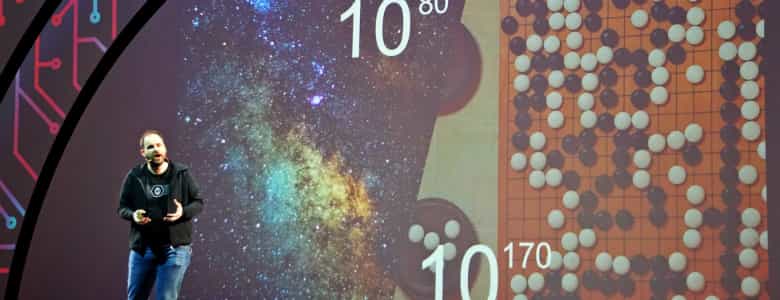The Tech of Humanity

In the past, spreadsheets were literal sheets of paper inked with grids of cells; calculations and programming were done through punch cards.
If you wanted to speak to someone at length you had to write a letter or arrange to meet.
Today, technology has changed it all.
The processing power of a smart watch alone far surpasses that of computers used in the first moon landing, and artificial intelligence (AI) and robotics are transforming just about every industry, not to mention our personal lives.
What do these developments mean for humankind?
How can we adapt to this new normal, use technology to our advantage and still preserve and celebrate our humanity?
An eclectic line-up of speakers considered these questions at Meta Conversations: Tech and Humanity, a conference held on 18 September 2017 as part of the Singapore Week of Innovation and Technology (SWITCH).
Part ‘techie’, part ‘fuzzy’, all human
According to venture capitalist and author of the book The Fuzzy and the Techie Mr Scott Hartley, the key to helping society adapt to rapid technological advances is not to categorise people into ‘techies’ (the technologically inclined) and ‘fuzzies’ (those inclined towards the humanities).
Qualities from both ends of the spectrum are equally important, he said.
“In order to achieve maximum benefit from technology, we need philosophers as well as engineers… to know why we’re building what we’re building,” said Mr Hartley.
This gives the ‘why’ of new technologies renewed importance, along with the ‘what’ and the ‘how’, he added.
While many jobs will be taken over by machines — the McKinsey Global Institute estimates that 30 percent of the tasks in 60 percent of jobs will be automated — Mr Hartley thinks that humanity can still adapt by learning the skills necessary to stay relevant.
“A focus on ethics, empathy, the ability to ask the right questions, and the skills to both train machines and operate in a human-to-human interface will be essential in the future,” he said.
“Information will be searchable, but data literacy will not.”
Speaking the machine language
Deep Blue’s and AlphaGo’s victories over human champions are powerful reminders of AI’s prowess and vast potential.
Yet, these milestones, though impressive, are not the same as addressing real-world issues, said Mr Øyvind Roti, head of solutions (Japan and Asia Pacific) at Google Cloud.
In games, players benefit from full knowledge of all the pieces on the board; real life, however, is much more complex.
This isn’t to say AI has no place in today’s world, said Mr Roti, relating the example of how the interactive platform Global Fishing Watch has used it to streamline processes.
By observing ship and trawler movement patterns via GPS, the platform’s AI can deduce the fishing methods employed, infer the species of fish targeted and then determine if the activity is illegal before passing the information to humans for action.
Given this potential, mankind should also help AI expand its capabilities, said Mr Roti, who likened machine learning to our early childhood endeavours to speak and read.
“You didn’t learn a language by taking up a dictionary and going through it. More likely, your parents led you through repeated examples, and you got it eventually through a lot of trial and error. For machine learning, this requires large datasets, good [programming] models, and lots of computation.”
He encouraged the community to contribute — by sharing code, data and results — and help to improve AI’s problem-solving abilities, thereby freeing up time and energy for humans to do “human things”.
Oh the humanity
The value of humanity was also forefront in the thoughts of Ms Kuik Shiao-Yin, Nominated Member of Parliament, Singapore, and Founder of The Thought Collective.
Ms Kuik reminisced about her first business venture — a start-up creating Flash websites — which she started as an architecture undergraduate with no experience with computers.
Still, she managed to pick up technical skills from friends in the know, as well as from open source code — a testament to how technology can open up possibilities and foster supportive communities, she shared.
But technology does have its limitations.
“What technology can do is to help us play a bigger, better game; it can’t tell us which game is truly worth the playing,” she reminded the audience.
Emphasising the importance of humanity within technology, Ms Kuik said that the latter can, and must, be used to enhance the former.
An example of this, she said, is the mobile app myResponder.
Jointly developed by the Singapore Civil Defence Force and GovTech, the app alerts volunteers trained in cardiopulmonary resuscitation to nearby cardiac arrests, thus cutting response times and increasing the chances of patient survival.
myResponder has not only saved multiple lives, but has also amplified responders’ spirit of empathy, compassion and willingness to help, said Ms Kuik.
By signing up, she herself felt rooted in a sense of responsibility to the community.
Humans should thus strive to build technologies that bring out our inner citizens or humanitarians, rather than our inner consumers or hedonists, she said.
“The most profound technologies we create will be those that enable us to live out a ‘who’ and a ‘why’ we never thought we had within us,” she concluded.
https://www.tech.gov.sg/media/technews/the-tech-of-humanity
